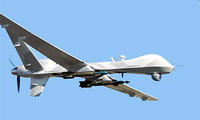-
Pennsylvania cybersecurity group takes down international criminal network
Over the past month, a coalition of cybersecurity forces in Pittsburgh, Pennsylvania made of regional FBI officers and members of Carnegie Mellon University’s CERT cyberteam, took down the Gameover Zeus cyber theft network, which had employed data ransom and theft schemes. The criminal group was able to snatch funds up to seven figures from owners’ bank accounts.
-
-
Military implications of advances in brain research
Researchers funded by the Pentagon’s Defense Advanced Research Projects Agency(DARPA) have developed a new way to visualize the complete brain in three-dimensional imaging. The breakthrough could advance the field of rapid brain imaging, allowing scientists to see in greater detail how parts of the brain interact on a cellular level and better understand those interactions throughout the brain. A former DARPA program manager recently told a policy group that “It turns out the expert marksman has a brain state, a state that they enter before they take the perfect shot. Can I teach a novice to create this brain state? The answer was yes.”
-
-
Leaked documents reveal law enforcement hacking methods

Through the sourcing of a leaked documents cache from the Italian firm Hacking Team, members of the University of Toronto’s Citizen Lab have revealed the methods of law-enforcement hackers. While much of Snowden’s revelations concerned broad international surveillance, documents from Hacking Team reveal more specific methods such as the actual techniques for tapping phones and computers to operate as eavesdropping devices.
-
-
Privacy advocates worried about new Senate cybersecurity bill
Privacy groups are concerned that a new Senate cybersecurity bill could give the NSA unrestricted access to personal information of Americans. The Cybersecurity Information Sharing Act (CISA), a counterpart to the Cyber Intelligence Sharing and Protection Act (CISPA) which passed the House in 2013, would create a “gaping loophole in existing privacy law,” several privacy advocacy groups wrote in a letter to lawmakers.
-
-
Drones must be used wisely to help advance U.S. interests

A new report examines three key issue sets in the unmanned aerial vehicle (UAV) debate: defense utility, national security, and economics; ethics and law; and export controls and regulatory challenges. The report concludes that UAV technologies are here to stay. Used recklessly, UAVs can endanger U.S. interests and diminish regional and global stability. Used wisely, they can help advance U.S. national security interests in the midst of a more robust global commitment to the rule of law.
-
-
Drones are cheap, soldiers are not: a cost-benefit analysis of war
Cost is largely absent in the key debates around the use of unmanned drones in war, even though drones are a cost-effective way of achieving national security objectives. Drones will never completely replace soldiers, but the drone-vs.-human being debate is becoming less important in the current strategic climate. The operating environments where drones are deployed — countries such as Pakistan, Somalia and Yemen — do not emphasize “hearts and minds” strategies where the human element has traditionally been valued as a force multiplier. Instead, objectives in these countries involve attacks on specific individuals, with operational data obtained by signal intelligence beforehand. Human contact becomes even less desirable given that a key tactic of combatants in these weak states is attrition with the aim of creating low-level civil conflicts. The end goal of these actions is to inflict high economic costs to the adversary. As a result, this remote and analytical method of engaging militarily leads to substantial cost efficiencies.
-
-
Obama administration wants $500 million to train, equip moderate Syrian rebels
The Obama administration is planning to escalate U.S. involvement in the Syrian civil war, and has asked Congress for $500 million for the U.S. military to train and equip moderate Syrian rebels. The training program would be the most significant action yet by the United States in the conflict in Syria. Yesterday’s (Thursday) request to Congress comes as the administration is looking for effective alternatives to the jihadist ISIS which is now in control of large swaths of Syria and Iraq. The $500 million request is separate from the $5 billion Counterterrorism Partnerships Fund, of which some $1.5 billion would go toward counterterrorism efforts in countries around Syria — Jordan, Lebanon, Turkey, and Iraq. The president also wants to set aside $500 million to “address unforeseen contingencies” in counterterrorism, which administration officials said was a reference to developments in Iraq.
-
-
Supreme Court: police must obtain a warrant to search suspect’s cellphone
Earlier this week the Supreme Courtruled that law enforcement must obtain a warrant to search a suspect’s cellphone. Law enforcement argued that no current law makes a distinction between cellphones and the pocket litter (wallets, cigarette packs) which police have always been permitted to search when arresting a suspect, but Chief Justice John Roberts rejected this argument, saying, “That is like saying a ride on horseback is materially indistinguishable from a flight to the moon,” adding: . “Modern cell phones, as a category, implicate privacy concerns far beyond those implicated by the search of a cigarette pack, a wallet or a purse.” Roberts acknowledged that requiring police to seek a warrant could impede some investigations but “privacy comes at a cost,” he said.
-
-
Sandia Labs-developed IED detector being transferred to the U.S. Army
Though IED detonations have declined in Afghanistan since a peak of more than 2,000 in the month of June 2012, Department of Defense reports indicated IEDs accounted for about 60 percent of U.S. casualties that year. Detecting improvised explosive devices in Afghanistan requires constant, intensive monitoring using rugged equipment. When Sandia researchers first demonstrated a modified miniature synthetic aperture radar (MiniSAR) system to do just that, some experts did not believe it. Those early doubts, however, are gone. Sandia’s Copperhead — a highly modified MiniSAR system mounted on unmanned aerial vehicles (UAVs) — has been uncovering IEDs in Afghanistan and Iraq since 2009. Now, Sandia is transferring the technology to the U.S. Army to support combat military personnel.
-
-
A farewell to (nuclear) arms: A novel technique could facilitate nuclear disarmament
A proven system for verifying that apparent nuclear weapons slated to be dismantled contained true warheads could provide a key step toward the further reduction of nuclear arms. The system would achieve this verification while safeguarding classified information that could lead to nuclear proliferation. Their novel approach, called a “zero-knowledge protocol,” would verify the presence of warheads without collecting any classified information at all.
-
-
Hazardous devices teams to compete at Robot Rodeo
Hazardous devices teams from around the Southwest will wrangle their bomb squad robots at the eighth annual Robot Rodeo beginning Tuesday, 24 June at Los Alamos National Laboratory.
-
-
Judge rules use of NSA surveillance-based information in terrorist case is legal
Lawyers for Mohamed Mohamud, a U.S. citizen who lived in Oregon, have been denied a motion to dismiss his terrorism conviction, with the court affirming the legality of the U.S. government’s bulk phone and e-mail data collection of foreign nationals living overseas. Mohamud’s defense team claimed the surveillance violated his constitutional rights, and that federal prosecutors did not make available to the defense evidence obtained via the surveillance. U.S. District Judge Garr King upheld Mohamud’s conviction, saying that suppressing the evidence collected through NSA surveillance “and a new trial would put defendant in the same position he would have been in if the government notified him of the (surveillance) at the start of the case.”
-
-
Experts urge deployment of earthquake warning system in California
Scientists say that California has “99.7 percent chance of experiencing a severe earthquake — magnitude 6.7 or higher on the Richter scale — within the next 30 years.” These scientists are urging Congress to consider funding the full-scale deployment of an early-warning earthquake system on the western coast of the United States following successful testing of a prototype and positive results from similar international systems.
-
-
OPCW says Syria has completed handover of chemical weapons, but some are skeptical
Syria handed over the remaining 100 tons of toxic material to the Organization for the Prohibition of Chemical Weapons (OPCW) last Monday. The final consignment, publicly delayed, consisted of about 8 percent of the total 1,300 tons that the country is believed to have possessed. Despite the celebratory mood, many in the West look at the Syrian and OPCW announcements skeptically due to conflicting information.
-
-
Historic proportions of Iraq’s military collapse raise questions about Iraq’s viability
“The scale of Iraq’s military collapse is of historic proportions,” one military analyst said. A recent assessment of the Iraqi military found that 60 out of 243 Iraqi Army combat battalions “cannot be accounted for, and all of their equipment is lost.” American military officials said an evaluation of the state of Iraq’s military revealed that five of the Iraqi Army’s fourteen divisions were “combat ineffective,” including the two that were overrun in Mosul. The United States has spent $1.7 trillion in Iraq since 2003, of which $25 billion were used to equip and train the post-Saddam Iraqi military. The United States received no return on its huge investment in Iraq, but it was hoped that at least the Iraqi military, U.S.-trained and U.S.-equipped, would provide a solid, professional foundation for a new Iraq. Developments in Iraq last week proved that this hope was illusory.
-
More headlines
The long view
Factories First: Winning the Drone War Before It Starts
Wars are won by factories before they are won on the battlefield,Martin C. Feldmann writes, noting that the United States lacks the manufacturing depth for the coming drone age. Rectifying this situation “will take far more than procurement tweaks,” Feldmann writes. “It demands a national-level, wartime-scale industrial mobilization.”
How Male Grievance Fuels Radicalization and Extremist Violence
Social extremism is evolving in reach and form. While traditional racial supremacy ideologies remain, contemporary movements are now often fueled by something more personal and emotionally resonant: male grievance.
The Surprising Reasons Floods and Other Disasters Are Deadlier at Night
It’s not just that it’s dark and people are asleep. Urban sprawl, confirmation bias, and other factors can play a role.
Why Flash Flood Warnings Will Continue to Go Unheeded
Experts say local education and community support are key to conveying risk.
